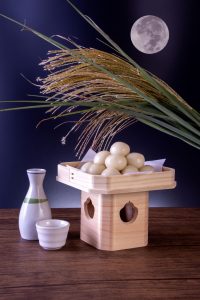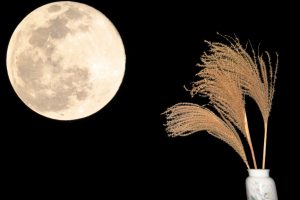Hello, everyone.
I would like to introduce another Japanese tradition “十五夜 (Jugoya)” today. “十五夜 (Jugoya)” is an activity to appreciate good harvest and view the beautiful moon. It’s September 21 this year.
On the day of “十五夜 (Jugoya)”, the first event is “月見 (Tsukimi)”. The most common offerings are “Tsukimi Dango (rice cakes)” and “Susuki (Japanese plume grass)”. We also offer fall harvests such as tuber, edamame, chestnuts, fruit as well as water and sake.

What is “Tsukimi Dango (rice cakes)”?
It is round like the moon, and we offer either 12, 13 or 15 rice cakes. There are two theories for these numbers. (1) There are 12 full moons per year except for some leap years in which case the number is 13, and (2) It’s 15 since full moons occur on the 15th of the month (according to the old calendar).
Why do we offer “Susuki (Japanese plume grass)”?
We are supposed to offer rice, but since Jugoya comes before rice harvesting time, Susuki, which looks like rice, is substituted.
We eat the offerings after Tsukimi. Eating the offerings is believed to bring health and happiness.
In addition to Jugoya, there is “十三夜 (Jusanya)”. This year’s Jusanya falls on October 18, Monday. It’s about a month after the harvest moon, Jugoya. People believe that Jusanya is the second most beautiful moon. Moon viewing on Jusanya has been a cherished tradition for a long time.
Watching moon either on Jugoya or Jusanya is considered to bring back luck. In the old days, people often watched the moon on Jugoya and Jusanya from the same garden.

If this year’s Jugoya happens to be a clear night, I urge you to watch the moon!










